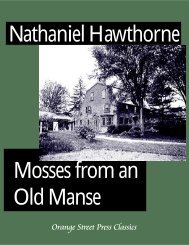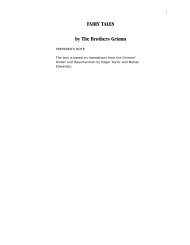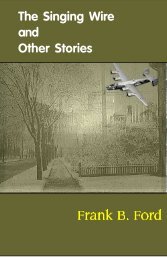- Page 1 and 2: Beowulf Translated by Gummere Orang
- Page 3 and 4: BEOWULF Contents I.................
- Page 5 and 6: BEOWULF PRELUDE OF THE FOUNDER OF T
- Page 7 and 8: BEOWULF on the breast of the boat,
- Page 9 and 10: BEOWULF I Now Beowulf bode in the b
- Page 11: BEOWULF that he heard each day the
- Page 15 and 16: BEOWULF when once had been traced t
- Page 17 and 18: BEOWULF and ne'er could the prince
- Page 19 and 20: BEOWULF III THUS seethed unceasing
- Page 21 and 22: BEOWULF headlands broad. Their have
- Page 23 and 24: BEOWULF 1 Ship. 2 That is, since Be
- Page 25 and 26: BEOWULF dark ill-doer, in dusky nig
- Page 27 and 28: BEOWULF and the gleam of it lighten
- Page 29 and 30: BEOWULF ne'er met I as strangers of
- Page 31 and 32: BEOWULF VI HROTHGAR answered, helme
- Page 33 and 34: BEOWULF Beowulf spake, -- his breas
- Page 35 and 36: BEOWULF in the doom of the Lord who
- Page 37 and 38: BEOWULF VII HROTHGAR spake, the Scy
- Page 39 and 40: BEOWULF Gathered together, the Geat
- Page 41 and 42: BEOWULF rolled the rough waves. In
- Page 43 and 44: BEOWULF hard and hand-linked, help
- Page 45 and 46: BEOWULF ne'er heard I a harder 'nea
- Page 47 and 48: BEOWULF with winsome words. Came We
- Page 49 and 50: BEOWULF fight for the fiend in that
- Page 51 and 52: BEOWULF Not with the sword, then, t
- Page 53 and 54: BEOWULF XI THEN from the moorland,
- Page 55 and 56: BEOWULF swallowed him piecemeal: sw
- Page 57 and 58: BEOWULF that not ever at all might
- Page 59 and 60: BEOWULF far off flit to the fiends'
- Page 61 and 62: BEOWULF XIII MANY at morning, as me
- Page 63 and 64:
BEOWULF of Beowulf's quest right cl
- Page 65 and 66:
BEOWULF for the warrior's wayfaring
- Page 67 and 68:
BEOWULF XIV HROTHGAR spake, -- to t
- Page 69 and 70:
BEOWULF force of the foe. Fain, too
- Page 71 and 72:
BEOWULF XV THERE was hurry and hest
- Page 73 and 74:
BEOWULF cup in hall: 2 for such cos
- Page 75 and 76:
BEOWULF XVI AND the lord of earls,
- Page 77 and 78:
BEOWULF and rescue his remnant by r
- Page 79 and 80:
BEOWULF Then wound up to welkin the
- Page 81 and 82:
BEOWULF XVII THEN hastened those he
- Page 83 and 84:
BEOWULF The lay was finished, the g
- Page 85 and 86:
BEOWULF 2 Nephew to Hrothgar, with
- Page 87 and 88:
BEOWULF sovran strong: under shield
- Page 89 and 90:
BEOWULF bucklers bright; on the ben
- Page 91 and 92:
BEOWULF a warrior watching and wait
- Page 93 and 94:
BEOWULF dole in the dwellings: 'twa
- Page 95 and 96:
BEOWULF in arms he fell. Now anothe
- Page 97 and 98:
BEOWULF wan to welkin when winds be
- Page 99 and 100:
BEOWULF wave-maned steed. The sovra
- Page 101 and 102:
BEOWULF less doughty in swimming wh
- Page 103 and 104:
BEOWULF honor of earls. With the ot
- Page 105 and 106:
BEOWULF hard of edge: with Hrunting
- Page 107 and 108:
BEOWULF to harm the heart: its hard
- Page 109 and 110:
BEOWULF XXIII 'MID the battle-gear
- Page 111 and 112:
BEOWULF who waited with Hrothgar, w
- Page 113 and 114:
BEOWULF the thane-band choice of th
- Page 115 and 116:
BEOWULF XXIV BEOWULF spake, bairn o
- Page 117 and 118:
BEOWULF who have scattered their go
- Page 119 and 120:
BEOWULF above all men, yet blood-fi
- Page 121 and 122:
BEOWULF XXV "UNDER harness his hear
- Page 123 and 124:
BEOWULF that I on this head all hew
- Page 125 and 126:
BEOWULF that Darling of Danes. The
- Page 127 and 128:
BEOWULF wielding the war-wood to wi
- Page 129 and 130:
BEOWULF hale to his home, and in ha
- Page 131 and 132:
BEOWULF XXVII CAME now to ocean the
- Page 133 and 134:
BEOWULF Hygelac Hrethling: at home
- Page 135 and 136:
BEOWULF the spear-bold warrior; wis
- Page 137 and 138:
BEOWULF with manly words. The mead
- Page 139 and 140:
BEOWULF have I heard under heaven!
- Page 141 and 142:
BEOWULF after havoc of heroes, thos
- Page 143 and 144:
BEOWULF by devilish craft, of drago
- Page 145 and 146:
BEOWULF nor might they e'en, when m
- Page 147 and 148:
BEOWULF XXXI "So held this king to
- Page 149 and 150:
BEOWULF and acts of honor. At ale h
- Page 151 and 152:
BEOWULF unknown to mortals. Some ma
- Page 153 and 154:
BEOWULF left to live, the last of t
- Page 155 and 156:
BEOWULF folded in fire: the folk of
- Page 157 and 158:
BEOWULF for sons of the soil; and s
- Page 159 and 160:
BEOWULF sad in heart, 'twas heavies
- Page 161 and 162:
BEOWULF their craft of contest, who
- Page 163 and 164:
BEOWULF XXXIV THE fall of his lord
- Page 165 and 166:
BEOWULF "Through store of struggles
- Page 167 and 168:
BEOWULF 2 That is, the king could c
- Page 169 and 170:
BEOWULF pact of peace, but pushed t
- Page 171 and 172:
BEOWULF old folk-defender, feud wil
- Page 173 and 174:
BEOWULF or endure those deeps, 4 fo
- Page 175 and 176:
BEOWULF naked in battle, as never i
- Page 177 and 178:
BEOWULF XXXVI WIGLAF his name was,
- Page 179 and 180:
BEOWULF for hard-sword and helmet,
- Page 181 and 182:
BEOWULF that board 4 to the boss, a
- Page 183 and 184:
BEOWULF XXXVII 'TWAS now, men say,
- Page 185 and 186:
BEOWULF "I would fain bestow on son
- Page 187 and 188:
BEOWULF XXXVIII I HAVE heard that s
- Page 189 and 190:
BEOWULF weakening fast by the wall
- Page 191 and 192:
BEOWULF XXXIX IT was heavy hap for
- Page 193 and 194:
BEOWULF Though well he wished it, i
- Page 195 and 196:
BEOWULF for liegemen all than a lif
- Page 197 and 198:
BEOWULF and heavy of heart a head-w
- Page 199 and 200:
BEOWULF tones of his trumpet; the t
- Page 201 and 202:
BEOWULF and the folk-king there was
- Page 203 and 204:
BEOWULF "Such is the feud, the foem
- Page 205 and 206:
BEOWULF Found on the sand there, st
- Page 207 and 208:
BEOWULF XLII A PERILOUS path, it pr
- Page 209 and 210:
BEOWULF to my liege and lord. Alive
- Page 211 and 212:
BEOWULF lying there lost. And littl
- Page 213 and 214:
BEOWULF deaths enow, and doom of ba






